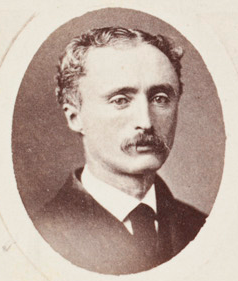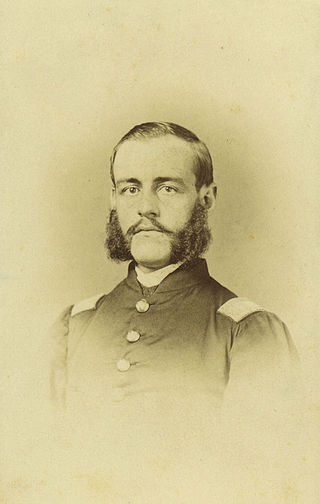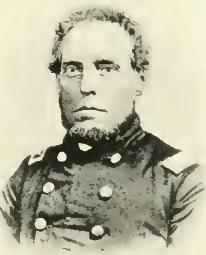
John Charles Black was a Democratic U.S. Congressman from Illinois. He received the Medal of Honor for his actions as a Union Army lieutenant colonel and regimental commander at the Battle of Prairie Grove during the American Civil War.

Aaron Fletcher Stevens was a Union Army officer during the American Civil War and a two-term U.S. Congressman.

Charles Lane Fitzhugh was a Union Army colonel during the American Civil War, who was later appointed a brevet brigadier general of volunteers for gallantry, energy and ability and a brevet brigadier general in the regular U.S. Army for gallant and meritorious services in the field during the war.

Edward Franc Jones was an American merchant, manufacturer, soldier, author and politician from New York.

Samuel Miller Quincy was the 28th mayor of New Orleans and a Union Army officer during the American Civil War.
Francis Winthrop Palfrey (1831–1889) was an American historian and Civil War officer.

Thomas Worcester Hyde was an American Union Army colonel, a state senator from Maine, and the founder of the Bath Iron Works, one of the major shipyards in the United States. He wrote two books about his experiences during the American Civil War and at the Battle of Gettysburg.

Thomas Scott Allen was an American printer, teacher, newspaper publisher, and politician. He served as the 9th Secretary of State of Wisconsin and served as a Union Army officer throughout the American Civil War.
Reuben D. Mussey Jr. was a Union Army colonel during the American Civil War and a distinguished lawyer. He was an important recruiter of black men into the United States Colored Troops. Between April 1865 and November 1865, Mussey was President Andrew Johnson's private secretary. Johnson nominated Mussey for appointment to the brevet grade of brigadier general of volunteers, but the U.S. Senate did not confirm the appointment. Mussey was the husband of Ellen Spencer Mussey who was also his law partner and became the head of the practice upon his death.

Charles Hamlin, from Bangor, Maine, was an attorney and a Union Army officer during the American Civil War, attaining the rank of major. He was nominated for appointment to the grade of brevet brigadier general of volunteers by President Andrew Johnson on January 13, 1866, to rank from March 13, 1865, and the United States Senate confirmed the appointment on March 12, 1866. He was one of the sons of Vice President Hannibal Hamlin and a brother to Cyrus Hamlin, a Union Army brigadier general.

John Francis Appleton was a lawyer and Union colonel in the American Civil War from the state of Maine who was awarded the honorary grade of brevet brigadier general, United States Volunteers.
Charles Wentworth Roberts (1828–1898) was a colonel in the Union Army during the American Civil War, who was awarded the rank of brevet brigadier general, United States Volunteers, in 1866, to rank from March 13, 1865. He was born in Old Town, Maine, and graduated from Bowdoin College, but lived most of his life in nearby Bangor, Maine. He was the son of prominent local lumber merchant Amos M. Roberts. His father was the wealthiest man in Bangor according to the 1840 census. Roberts enlisted as lieutenant colonel of the 2nd Maine Volunteer Infantry Regiment in 1861, the first unit to leave Maine in response to President Abraham Lincoln's call for volunteers to suppress the rebellion after the fall of Fort Sumter. With the promotion of the regiment's colonel Charles Davis Jameson, USV, to brigadier general, Roberts became colonel of the regiment. Roberts had a horse shot out from under him at the Second Battle of Bull Run, when he commanded the 1st Brigade while General John H. Martindale suffered from typhoid fever. Roberts retired due to ill health in 1863 and was succeeded on January 10, 1863, by Colonel George Varney. Then Lieutenant Colonel Varney had led the regiment at the Battle of Fredericksburg on December 13, 1863, where he received a head wound from a shell fragment. President Andrew Johnson nominated Colonel Roberts for the award of the grade of brevet brigadier general, United States Volunteers, on February 24, 1866, and the brevet was confirmed by the U. S. Senate on April 10, 1866, to rank from March 13, 1865.
George Perkins Hawkes was a colonel in the Union Army during the American Civil War. He commanded the 21st Regiment Massachusetts Volunteer Infantry from April 1863 to July 1864. In March 1867, he was awarded the honorary grade of brevet brigadier general, United States Volunteers, to rank from March 13, 1865, seven months after his resignation of his commission in the army.

Caspar Crowninshield was a volunteer officer in the Union Army during the American Civil War.
Greely Stevenson Curtis was a volunteer officer in the Union Army during the American Civil War.

Nelson H. Davis was a general in the United States Army; serving in the Mexican–American War, the American Civil War and in actions against the Apache people in New Mexico.

Thomas Hamlin Hubbard was a Union Army colonel from Maine during the Civil War who was awarded the honorary grade of brevet brigadier general, United States Volunteers, for meritorious service. After the war, Hubbard was a lawyer, railroad executive, financier, businessman and philanthropist.

Sylvester Gardner Hill was a colonel in the Union Army during the American Civil War. He served as a brigade commander during the Red River Campaign and Battle of Nashville where he was killed in action. He received a posthumous appointment as a brevet brigadier general.
John Egbert Farnum was a brevet general in the United States Army during the Mexican–American War and the American Civil War.
Adolph Engelmann was a farmer, lawyer, postmaster, Mexican–American War veteran, and Union Army colonel during the American Civil War. On May 18, 1866, the United States Senate confirmed his appointment as brevet brigadier general of volunteers.












